14 start with V start with V
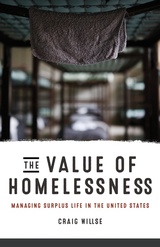
It is all too easy to assume that social service programs respond to homelessness, seeking to prevent and understand it. The Value of Homelessness, however, argues that homelessness today is an effect of social services and sciences, which shape not only what counts as such but what will?or ultimately won’t?be done about it.
Through a history of U.S. housing insecurity from the 1930s to the present, Craig Willse traces the emergence and consolidation of a homeless services industry. How to most efficiently allocate resources to control ongoing insecurity has become the goal, he shows, rather than how to eradicate the social, economic, and political bases of housing needs. Drawing on his own years of work in homeless advocacy and activist settings, as well as interviews conducted with program managers, counselors, and staff at homeless services organizations in New York, Los Angeles, San Francisco, and Seattle, Willse provides the first analysis of how housing insecurity becomes organized as a governable social problem.
An unprecedented and powerful historical account of the development of contemporary ideas about homelessness and how to manage homelessness, The Value of Homelessness offers new ways for students and scholars of social work, urban inequality, racial capitalism, and political theory to comprehend the central role of homelessness in governance and economy today.
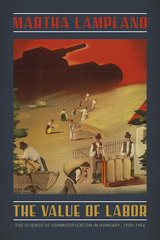
Lampland trains her eye on the scientific claims of modern economic modeling, using Hungary’s unique vantage point to show how theories, policies, and techniques for commodifying agrarian labor that were born in the capitalist era were adopted by the socialist regime as a scientifically designed wage system on cooperative farms. Paying attention to the specific historical circumstances of Hungary, she explores the ways economists and the abstract notions they traffic in can both shape and be shaped by local conditions, and she compellingly shows how labor can be commodified in the absence of a labor market. The result is a unique account of economic thought that unveils hidden but necessary continuities running through the turbulent twentieth century.
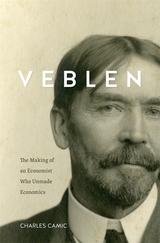
A bold new biography of the thinker who demolished accepted economic theories in order to expose how people of economic and social privilege plunder their wealth from society’s productive men and women.
Thorstein Veblen was one of America’s most penetrating analysts of modern capitalist society. But he was not, as is widely assumed, an outsider to the social world he acidly described. Veblen overturns the long-accepted view that Veblen’s ideas, including his insights about conspicuous consumption and the leisure class, derived from his position as a social outsider.
In the hinterlands of America’s Midwest, Veblen’s schooling coincided with the late nineteenth-century revolution in higher education that occurred under the patronage of the titans of the new industrial age. The resulting educational opportunities carried Veblen from local Carleton College to centers of scholarship at Johns Hopkins, Yale, Cornell, and the University of Chicago, where he studied with leading philosophers, historians, and economists. Afterward, he joined the nation’s academic elite as a professional economist, producing his seminal books The Theory of the Leisure Class and The Theory of Business Enterprise. Until late in his career, Veblen was, Charles Camic argues, the consummate academic insider, engaged in debates about wealth distribution raging in the field of economics.
Veblen demonstrates how Veblen’s education and subsequent involvement in those debates gave rise to his original ideas about the social institutions that enable wealthy Americans—a swarm of economically unproductive “parasites”—to amass vast fortunes on the backs of productive men and women. Today, when great wealth inequalities again command national attention, Camic helps us understand the historical roots and continuing reach of Veblen’s searing analysis of this “sclerosis of the American soul.”

The book is divided into three parts. Part I, "Vietnamese Society in the Early Twentieth Century," takes a micro approach to the study of Vietnamese society on the eve of the irreversible social transformation that occurred as the colonial infrastructure took root in Indochina. Part II, "Vietnamese Intellectuals: Contesting Colonial Power," contains biographical accounts of Vietnamese intellectuals who tried to reform their society under colonial domination. Part III, "Post-Colonial Vietnam: From Welfare State to Market-Oriented Economy," traces Vietnam's search for a viable economic model while maintaining itself as a socialist state.
The book speaks to diverse themes, including the nature of village life, the development of health care during the colonial era, the status of women, the role of Vietnamese intellectuals in the anticolonial struggle, the building of a socialist state, contemporary rural migration, labor relations, and Vietnam in an age of globalization.
Gisele Bousquet is Research Associate at the Center for Southeast Asian Studies, University of California, Berkeley. Pierre Brocheux is Maître de Conference of History, Université Denis Diderot-Paris VII.

In the late 1980s, most of the world still associated Vietnam with resistance and war, hardship, refugees, and a mismanaged planned economy. During the 1990s, by contrast, major countries began to see Vietnam as both a potential partner and a strategically significant actor—particularly in the competition between the United States and an emerging China—and international investors began to see Vietnam as a land of opportunity.
Vietnam remains a Leninist party-state ruled by the Communist Party of Vietnam that has reconciled the supposedly irreconcilable: a one-party system and a market-based economy linked to global value chains. For the Party stability is crucial and, recently, increasing economic openness has been combined with growing political control and repression.
This book, undertaken by scholars from Vietnam, North America, and Europe, focuses on how the country’s governance shapes its politics, economy, social development, and relations with the outside world, as well as on the reforms required if Vietnam is to become a sustainable and modern high-income nation in the coming decades.
Despite the challenges, including systemic ones, the authors remain optimistic about Vietnam’s future, noting the evident vitality of a determined society.

In the late 1980s, most of the world still associated Vietnam with resistance and war, hardship, refugees, and a mismanaged planned economy. During the 1990s, by contrast, major countries began to see Vietnam as both a potential partner and a strategically significant actor—particularly in the competition between the United States and an emerging China—and international investors began to see Vietnam as a land of opportunity.
Vietnam remains a Leninist party-state ruled by the Communist Party of Vietnam that has reconciled the supposedly irreconcilable: a one-party system and a market-based economy linked to global value chains. For the Party stability is crucial and, recently, increasing economic openness has been combined with growing political control and repression.
This book, undertaken by scholars from Vietnam, North America, and Europe, focuses on how the country’s governance shapes its politics, economy, social development, and relations with the outside world, as well as on the reforms required if Vietnam is to become a sustainable and modern high-income nation in the coming decades.
Despite the challenges, including systemic ones, the authors remain optimistic about Vietnam’s future, noting the evident vitality of a determined society.
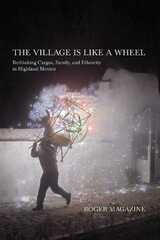
According to Magazine, where Western anthropologists often assume that persons are individuals capable of acting on their own to produce things, rural highland Mexicans see persons as inherently interdependent and in need of others even to act. He utilizes the term “active subjectivity” to denote the fact that what they produce in others is not simply action but also a subjective state or attitude of willingness to perform the action.
The author’s goals are to improve understandings of rural highland Mexicans’ lives and to contribute to a broader disciplinary effort aimed at revealing the cultural specificity or ethnocentricity of our supposedly universally applicable concepts and theories.

Greenport today boasts a population that is one-third Hispanic. Gordon contends that these immigrants have effectively saved the town’s economy by taking low-skill jobs, increasing the tax base, filling local schools, and patronizing local businesses. Greenport’s seaside beauty still attracts summer tourists, but it is only with the support of the local Latino workforce that elegant restaurants and bed-and-breakfasts are able to serve these visitors. For Gordon the picture is complex, because the wave of immigrants also presents the town with challenges to its services and institutions. Gordon’s portraits of local immigrants capture the positive and the negative, with a cast of characters ranging from a Guatemalan mother of three, including one child who is profoundly disabled, to a Colombian house painter with a successful business who cannot become licensed because he remains undocumented. Village of Immigrants weaves together these people’s stories, fears, and dreams to reveal an environment plagued by threats of deportation, debts owed to coyotes, low wages, and the other bleak realities that shape the immigrant experience—even in the charming seaport town of Greenport.
A timely contribution to the national dialogue on immigration, Gordon’s book shows the pivotal role the American small town plays in the ongoing American immigrant story—as well as how this booming population is shaping and reviving rural communities.
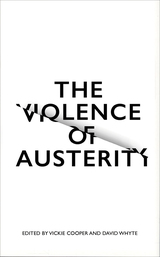
In The Violence of Austerity, David Whyte and Vickie Cooper bring together the passionate voices of campaigners and academics to show that rather than stimulating economic growth, austerity policies have led to a dismantling of the social systems that operated as a buffer against economic hardship. Chapters from major contributors—including Danny Dorling, Mary O’Hara and Rizwaan Sabir—show how austerity is a form of institutional violence more socially harmful and far-reaching than other more politicized and publicized forms of violence, such as terrorism or gun violence. Contributors expose highly significant cases of this institutional violence driven by public sector cuts: police attacks on the homeless, violent evictions of the rented sector, risks faced by people on workfare, and more. The Violence of Austerity is a devastating, authoritative study of the myriad ways austerity policies harm people in Britain that will resonate with anyone concerned with the increasing power of the political elite and the future of social welfare.
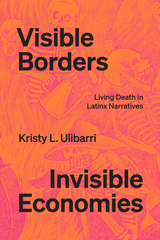
2023 Outstanding Book Award, National Association for Ethnic Studies
A thorough examination of the political and economic exploitation of Latinx subjects, migrants, and workers through the lens of Latinx literature, photography, and film.
Globalization in the United States can seem paradoxical: free trade coincides with fortification of the southern border, while immigration is reimagined as a national-security threat. US politics turn aggressively against Latinx migrants and subjects even as post-NAFTA markets become thoroughly reliant on migrant and racialized workers. But in fact, there is no incongruity here. Rather, anti-immigrant politics reflect a strategy whereby capital uses specialized forms of violence to create a reserve army of the living, laboring dead.
Visible Borders, Invisible Economies turns to Latinx literature, photography, and films that render this unseen scheme shockingly vivid. Works such as Valeria Luiselli’s Tell Me How It Ends and Alex Rivera’s Sleep Dealer crystallize the experience of Latinx subjects and migrants subjugated to social death, their political existence erased by disenfranchisement and racist violence while their bodies still toil in behalf of corporate profits. In Kristy L. Ulibarri’s telling, art clarifies what power obscures: the national-security state performs anti-immigrant and xenophobic politics that substitute cathartic nationalism for protections from the free market while ensuring maximal corporate profits through the manufacture of disposable migrant labor.

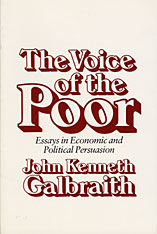
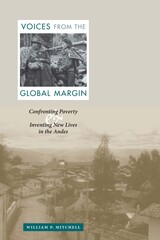
2007 — LASA Peru Flora Tristán Book Prize from the Peru Section – Latin American Studies Association
Voices from the Global Margin looks behind the generalities of debates about globalization to explore the personal impact of global forces on the Peruvian poor. In this highly readable ethnography, William Mitchell draws on the narratives of people he has known for forty years, offering deep insight into how they have coped with extreme poverty and rapid population growth—and their creation of new lives and customs in the process. In their own passionate words they describe their struggles to make ends meet, many abandoning rural homes for marginal wages in Lima and the United States. They chronicle their terror during the Shining Path guerrilla war and the government's violent military response. Mitchell's long experience as an anthropologist living with the people he writes about allows him to put the stories in context, helping readers understand the impact of the larger world on individuals and their communities. His book reckons up the human costs of the global economy, urging us to work toward a more just world.
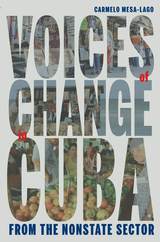
Based on eighty in-depth interviews recently conducted in Cuba, this book captures actual voices from this evolving economic sector. It details workers’ level of satisfaction with what they do and earn, profits (and how they are allocated between consumption and investment), plans to expand their activities, receiving foreign remittances and microcredit, competition, forms of advertising, and payment of taxes. Perhaps most revealing are the speakers’ views on the obstacles they face and their desires for change and improvement. As such, the book offers fascinating insights into today’s Cuban economy from the nonstate sector, while also reflecting on its potential for development and the obstacles it faces.
READERS
Browse our collection.
PUBLISHERS
See BiblioVault's publisher services.
STUDENT SERVICES
Files for college accessibility offices.
UChicago Accessibility Resources
home | accessibility | search | about | contact us
BiblioVault ® 2001 - 2024
The University of Chicago Press









